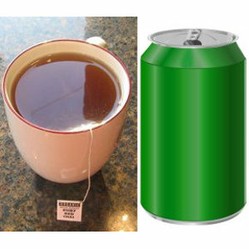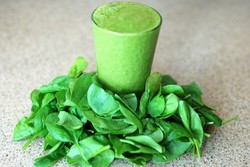Too much of anything can be harmful to the body, and neither tea nor soda are exceptions. But soda is much worse for you than tea!
The health risks of tea are mild, and only apply to very heavy tea consumption. Heavy tea consumption may inhibit the body's absorption of iron, particularly when the tea is consumed with a meal, but this effect can be mitigated by eating small quantities of meat and foods that contain Vitamin C, and this effect may be so small as to not even be an issue with anyone. Tea also contains caffeine, and too much caffeine is harmful, but cola and many other soft drinks also contain caffeine.
Sugar-laden soft drinks can contribute to numerous health problems:
Soda or soft drinks, on the other hand, carry much greater health risks. Because soda has so much sugar, it can contribute to weight gain and obesity, and can increase the risk of type 2 diabetes. A high sugar intake can also worsen or increase the risk of a variety of other health problems, including heart disease, anxiety and depression, high blood pressure, and liver problems. Perhaps more importantly, soft drinks provide empty calories, meaning that the calories come without other nutritional value. Natural calorie-rich foods like fruit, nuts, or whole grains also contain protein, fiber, and valuable micronutrients like vitamins and minerals. The greater your portion of empty calories, the less you get of vitamins, minerals, fiber, protein, and other beneficial nutrients.
Aside from the higher caloric content in the form of sugars (empty calories), sodas can also harm your health in other ways. Soda can contain the toxic and carcinogenic chemical Benzene, see Benzene in soft drinks. Soft drinks may also contribute to decreased bone density in women. Drinking very large amounts of soda can cause low potassium levels. One of the biggest concerns though with soda drinking is that drinking soda replaces drinking other more nutritive beverages, such as milk or fruit juice, or even tea or herbal teas which contain some phytonutrients.









 The Shaming of Femininity and Elevation of Masculinityon 07/13/2017
The Shaming of Femininity and Elevation of Masculinityon 07/13/2017
 What is Genderqueer or Non-Binary Gender?on 10/16/2015
What is Genderqueer or Non-Binary Gender?on 10/16/2015
 Resources for Learning Spanish Free Onlineon 04/13/2016
Resources for Learning Spanish Free Onlineon 04/13/2016
 Ways Native Plants Can Help Control Invasive Plantson 05/26/2016
Ways Native Plants Can Help Control Invasive Plantson 05/26/2016


Questions? Comments? Feedback?
Thank you! And yes...I don't talk about it as much on this page, but coffee is probably still healthier than sodas in a lot of ways, even though it usually does contain a lot more caffeine.
One idea that you might find helpful if you want to scale back the sweetness in sodas is to buy flavored seltzer water, the unsweetened type, just like seltzer water with lime flavoring, or whatever flavor you want. These are available in most supermarkets. If you find them not sweet enough for starters, try blending them with soda. I got into those a while back and now I just like drinking them straight, or mixing them with fruit juice, and I don't really like soda any more.
Very informative article. Actually I'm a coffee drinker. But my problem is I drink a lot of sodas too...I know I have to cut that down. :)
The effect of tea interfering with iron may not be a big deal, like I've read about it but I've read broader studies that find that it doesn't have much of an effect on total nutrition, so I wouldn't worry about it unless you're someone who has a severe problem with iron deficiency, and even then, it's something you can be mindful of by timing your cups of tea or drinking it with the right foods.
I didn't know tea interferes with the absorption of iron. I'll make sure to eat more fruit with vitamin C :) as I'm a big fan of tea :)